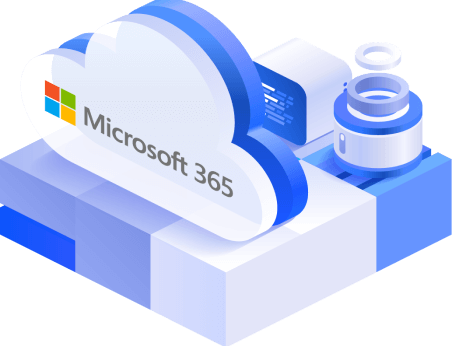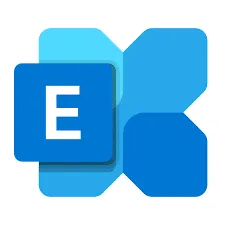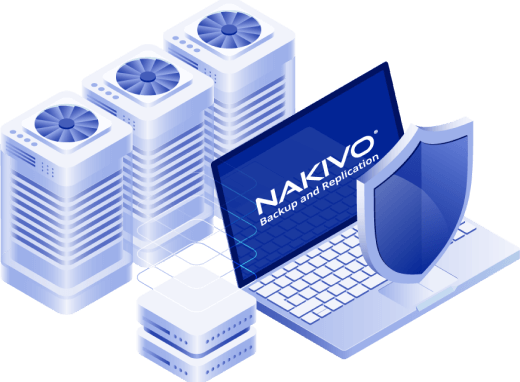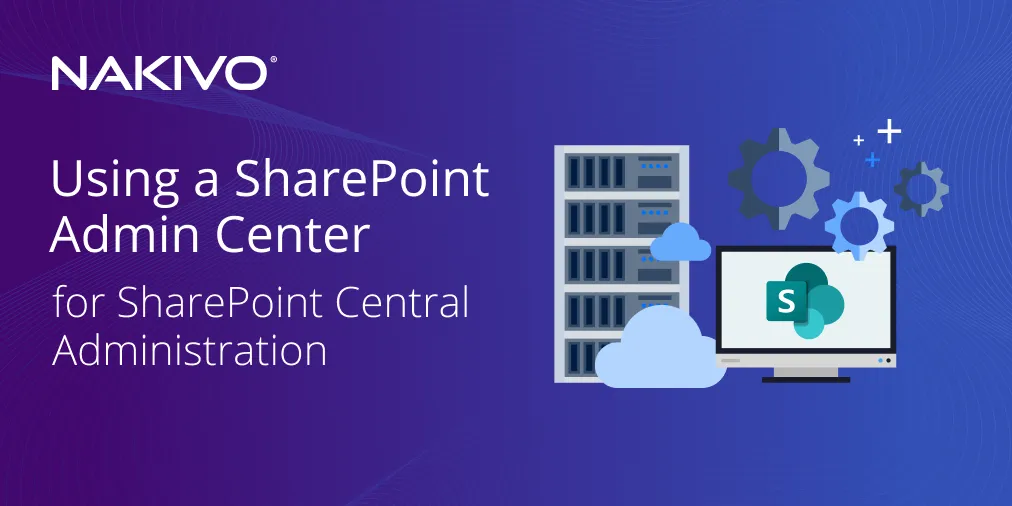An Overview of Microsoft Office 365 Suite
The Office 365 suite is a package of productivity applications intended for personal and business use. It includes well-known staples such as Word and Excel as well as business-oriented offerings like Exchange Online and Teams.
Office 365 is a cloud-based subscription service. Subscription service means that users pay a monthly rate to access the suite instead of a one-time installation fee. Cloud-based service means that applications are used directly from a web browser and any changes are automatically saved in the cloud. For most plans, users can also download desktop versions of the applications on multiple devices.
With application data saved in the cloud, users may be under the impression that their data is safe and recoverable at all times. However, Microsoft is not responsible for the safety of users’ data beyond geo-redundancy and limited retention policies. To avoid losing critical documents, use third-party Office 365 backup software to ensure that your application data are protected when using the suite.
What Office 365 Plans Are Available?
Microsoft offers several subscription plans for the Office 365 suite that are meant for various types of users. As plans become more expensive, they offer more applications, services, licenses and storage. There are three broad types of plans: Home, Business, and Enterprise. Home plans are for individual users, families or friend groups. Business plans are for small- and medium-business. Enterprise plans are for large corporations.
Pricing for Microsoft 365 Plans
| Microsoft 365 Plan | Cost | Snapshot | |
| HOME | Family | $7.99 per month | up to 6 users |
| Personal | $5.99 per month | only 1 user | |
| BUSINESS | Business Basic | $5.00 a user per month | web/mobile versions only |
| Business Standard | $12.50 a user per month | the core productivity applications and services | |
| Business Premium | $20.00 a user per month | the core plus advanced cyberthreat protection and device management tools | |
| Apps for business | $8.25 a user per month | only applications, no services | |
| ENTERPRISE | F3 | $10.00 a user per month | web/mobile focused for firstline workers |
| E3 | $32.00 a user per month | Business Premium plus more control and deeper functionality | |
| E5 | $57.00 a user per month | every available feature and service | |
| All business and enterprise plans require an annual commitment. | |||
What Is Microsoft Office 365 and Its Applications?
Office 365 is Microsoft’s suite of productivity applications. All plans include either desktop or web-only versions of these classic Office applications:
These are the core productivity and file management applications and services for business and enterprise users.
These are the advanced Office 365 applications that are employed by enterprises to further boost productivity.
The following is a complete list of applications included in the Office 365 suite: Access (PC only), Advanced Threat Analytics, Biz Apps, Bookings, Cloud App Security, Edge, Enterprise Mobility + Security, Forms, Intune, Kaizala, Microsoft Defender, Microsoft Family, Safety, Microsoft Stream, Microsoft To Do, Mobile apps, Planner, Power Automate, Project, SCCM (EMS), Sway, Visio, Whiteboard, Windows, and Workplace Analytics.
Office 365 Suite Comparison: Business vs. Enterprise Plans
To decide whether your business needs Office 365 Business or Enterprise, answer three questions:
- How big is your company?
- Is your data protected?
- What is your preferred Office 365 environment?
Company Size: The maximum number of users with Office 365 Business is 300 employees. This means that Enterprise plans are the only option if you want a single blanket plan for the whole company but have more than 300 employees. It’s important to note, however, that businesses can mix-and-match plans to cut costs if certain groups only require basic features.
Data Protection: Business plans provide modest security features whereas Enterprise plans offer more robust threat protection, device management and the Litigation Hold feature. Advanced Threat Protection, included in for Business and Enterprise, is an email filtering service that scans emails for malware and dangerous links. Enterprise plans add Advanced Threat Analytics to protect against targeted cyber-attacks and device management tools to control access. Litigation Holds help businesses comply with regulations by allowing long-term storage of data important for investigations and regulatory obligations.
Office 365 Environment: If a business wishes to use Office 365 in the default cloud-based environment, then either Business or Enterprise will work fine. If, however, the business wants to implement a hybrid environment to keep some data on-premise, only an Enterprise license will provide you with this option.
Office 365 Suite: Frequently Asked Questions
Can I get Office 365 for free?
Yes, you can get Office 365 for free with a 30-day free trial, free educational versions or Office Online.
- The Office 365 Free Trial grants complete access to the Family plan for one month. This includes licenses for 6 users.
- Students, faculty and staff at most educational institutions can use Office 365 Education free of charge. This plan includes the basic applications and several advanced ones, including PowerApps and Power BI.
- Office Online allows anyone to use the web-based versions of Word, Excel, PowerPoint, OneNote and Outlook for free.
How safe is my data?
Microsoft is responsible for protecting the Office 365 physical and virtual infrastructure and ensuring availability. Although Microsoft addresses certain security threats, it cannot prevent all malicious threats. Businesses are responsible for protecting their data. This means that if a business’s Office 365 data is compromised or corrupted, it is not Microsoft’s job to restore the data outside of the Software Licensing Terms. To protect data, businesses need to make sure they have data backup and recovery plans in place.
Is SharePoint part of Office 365?
SharePoint Online is included with the Office 365 Business and Enterprise plans. It is also available as a standalone service for businesses that do not need additional applications. Microsoft offers SharePoint Plan 1 for $5.00 per user per month and Plan 2 $10.00 per user per month. Plan 2 adds additional eDiscovery features and data loss prevention tools for compliance and litigation. Read this blog post to learn how to back up and recover Microsoft Office 365 SharePoint sites.
Is OneDrive part of Office 365?
OneDrive is included with every plan for the Office 365 suite. Home and Business plans include 1 TB of storage per user. Enterprise plans with more than 5 users include unlimited storage. Business and Enterprise plans use OneDrive for Business, which offers added administrative control and integrates with SharePoint team sites.
Conclusion
Microsoft Office 365 provides businesses with a productivity suite for the whole business cycle – from content creation and editing through to team collaboration and security tools. Available as a cloud-based service, Office 365 simplifies management with automatic updates and centralized controls. With a range of plans for personal users, small- and medium-sized businesses and enterprises, Office 365 has a perfect fit for users of any type.


















